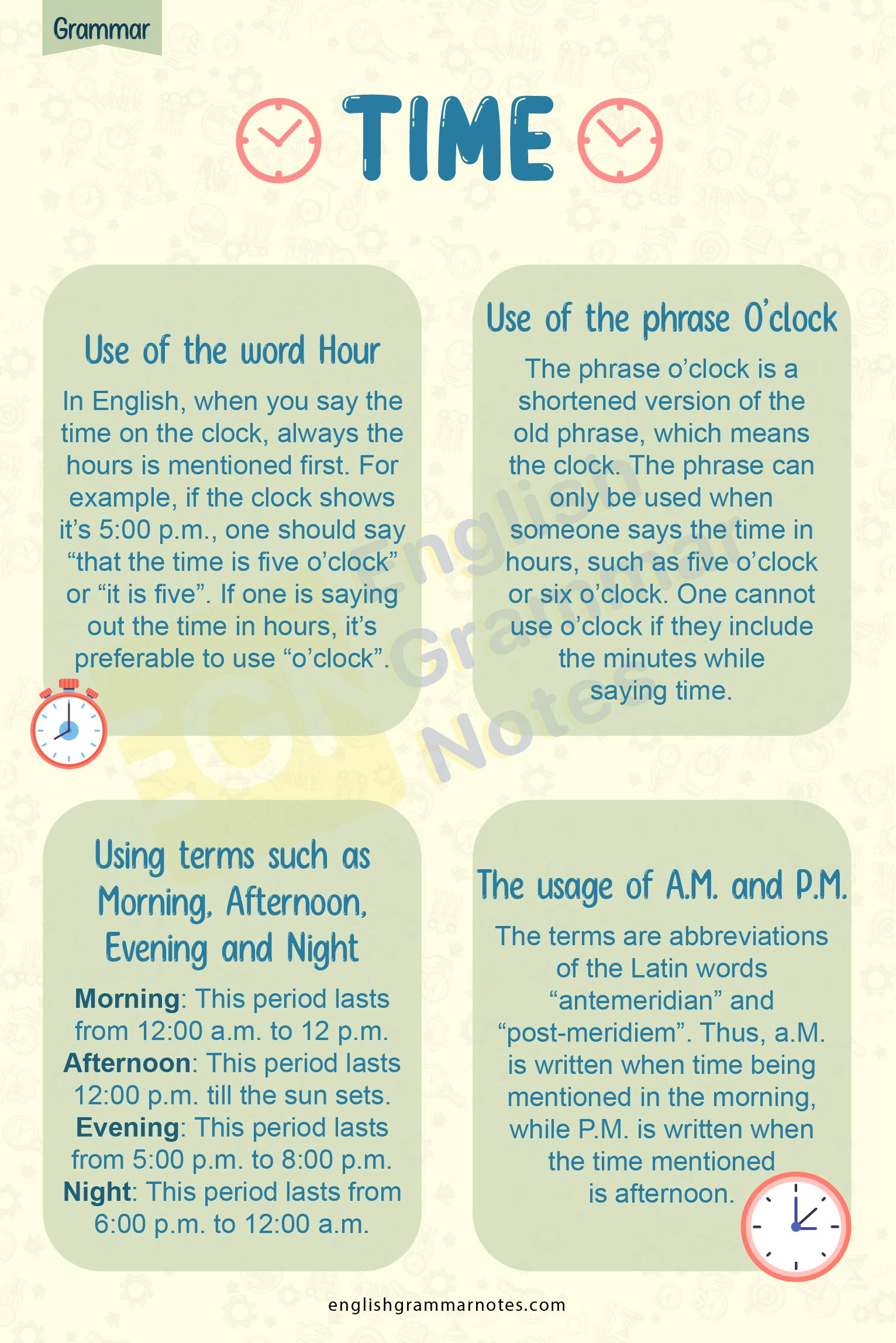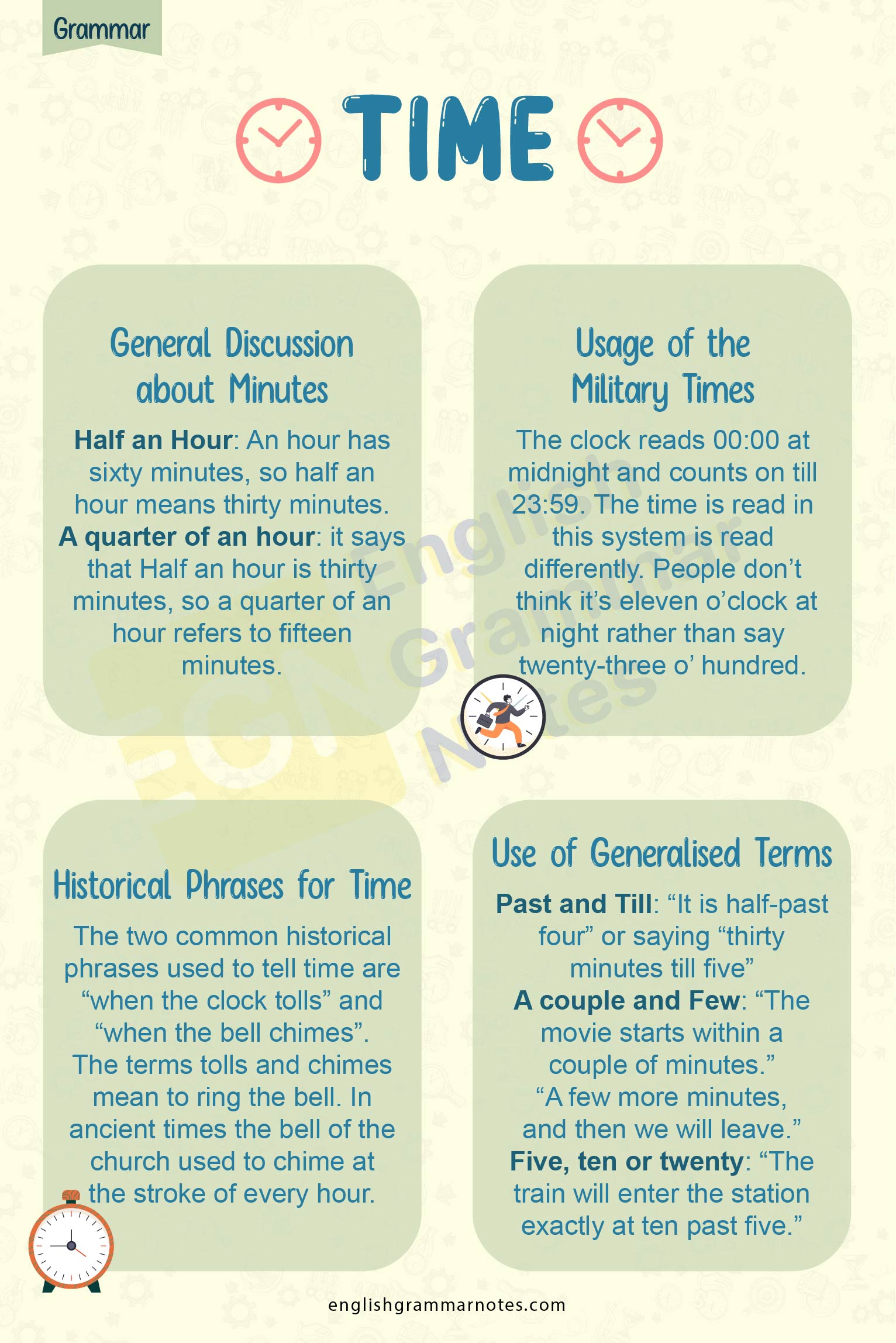How to Tell the TIME Properly in English: The measurement of the constantly changing surroundings from a single point of view is called time. This is the theoretical definition of time. Time as a concept is self-evident and intuiting. The steady movement of objects and passing of events in front of one’s eyes, the Moon’s orbit around the Earth are some ways of defining time but are not close to describing the basic nature of time.
Time is often referred to in numerical rather than in words. This has often led up to the wrong use and pronunciation of time in words. Telling time properly in English has still been a task not mastered up by everybody. Being fluent in any language requires being fundamental to talk about time in that language, and the same goes for English.
Talking about time does not only require saying the numbers on the clock. In order to sound affluent, one must use phrases and words commonly used by the speakers of the language. This article will discuss how to tell the time in English and dive deep into telling time in English exercises.
How to Tell the TIME Properly
- General Discussion about the Time of the Day
- Use of the word Hour
- Use of the phrase O’clock
- Using terms such as Morning, Afternoon, Evening and Night
- The usage of A.M and P.M.
- General Discussion about Minutes
- Usage of the Military Times
- Historical Phrases for Time
- Use of Generalised Terms
- The takeaway from this Article
General Discussion about the Time of the Day
Our Instead of telling the numbers on the clock, many people tell the general time of the day. For example, they use the terms such as morning, midday, noon, afternoon instead of being specific about the time.
Noon: This refers to the very beginning of the afternoon. When the clock strikes 12:00 p.m., then it’s called noon.
“What time are we meeting tomorrow ?”
“Around noon, so we can rest also”.
Midday: It often refers to the same time as noon since noon is the mid-point of the week. The term given here is also used to refer to the time period of 11:00 a.m. and the timing of 2:00 p.m. to be sure, it refers to the time period when people are having lunch.
“It is supposed to be very cold and windy today at midday”.
Afternoon: As the term says, this refers to the period after the period of noon. The time this period exist is between noon and the time the sunsets. The time for the sun to set remains the same if one lives in the Equator. The places which don’t fall under the Equator experiences sun sets at different times during different seasons, such as during the winter,s the sun sets at 4:00 p.m. while in summer the sun sets at 9.00 p.m.
“I am free this afternoon, so let’s have lunch together.”
Midnight: As the name suggests, it refers to the middle of the night. Many people consider midnight to start from 12:00 a.m. and to continue until the sun rises. However, the time period of midnight is usually considered to be 12:00 a.m to 3 in the morning.
“She proposed him on New Year’s Eve, at midnight.”
Twilight: The term is very popular among the younger generation because of the movie series named after it. However, the term refers to the period in the morning, just before the sun rises and after the sun sets in the evening. The sky usually sports a blue or a purple tint during this period.
“She loves to see the sky at twilight.”
Sunrise and Sunset: The period when the sun rises and when the sun sets down are called sunrise and sunset, respectively. The sun rises just after the twilight, and the sunsets just before the sky are not completely dark. If one lives under the Equator, then the time period of sunrise and sunset does not change, but when one moves away from the Equator, the timing of the sunrise and the sunset keeps changing depending on the seasons.
“He will climb the mountain before the sunsets.”
“We will reach home before the sunrise.”
After dark: The time of the day that is referred is here is between 9:00 p.m. and 1:00 a.m. in the morning. This usually refers to the beginning of the nightlife in a city when people go out. An easy way to remember the time period is when most people are going to sleep or have fallen asleep already.
“Manchester is the best place to visit after dark.”
Dawn: The period of the first light in the sky without the sun is called the dawn or the break of the dawn. Usually, the time period of 4:00 is to 6:00 am in the period of dawn.
“The first light at dawn is the most beautiful gift of nature.”
Use of the word Hour
In English, when you say the time on the clock, always the hours is mentioned first. For example, if the clock shows it’s 5:00 p.m., one should say “that the time is five o’clock” or “it is five”. If one is saying out the time in hours, it’s preferable to use “o’clock”.
Use of the phrase O’clock
it is already known to a set a phrase is a short form sentence or said to be not a sentence but makes sense in a conversation. The phrase o’clock is a shortened version of the old phrase, which means the clock. The phrase can only be used when someone says the time in hours, such as five o’clock or six o’clock. One cannot use o’clock if they include the minutes while saying time. Here’s the phrase o’clock with different hours of the day
1:00 – One o’clock, 2:00 – Two o’clock, 3- Three o’clock and so on.
Using terms such as Morning, Afternoon, Evening and Night
A clock in any part of the world has only twelve hours written on it. This means that each day will have the same time twice, once in the morning and one in the night. Thus, one can address the times by saying which part of the day it is. Hence, it is 5:00 in the morning or 5 in the evening to address time.
- Morning: This period lasts from 12:00 a.m. to 12 p.m.
- Afternoon: This period lasts from 12:00 p.m. till the sun sets.
- Evening: This period lasts from 5:00 p.m. to 8:00 p.m.
- Night: This period lasts from 6:00 p.m. to 12:00 a.m.
The usage of A.M. and P.M.
The terms are abbreviations of the Latin words “antemeridian” and “post-meridiem”. When someone tells the time, such as six o’clock, he should also address which part of the day it is. You can do this by adding a.m. and p.m. after the time. Thus, a.M. is written to address that time being mentioned in the morning, while P.M. is written to address that the time mentioned is afternoon.
“He left home at 12:00 p.m. and returned homes exactly after twelve hours at 12:00 a.m.”.

General Discussion about Minutes
While telling the time, one has to tell the exact readings from the clock. In order to tell the exact correct time, one has to mention the minutes along with the hour, such as 5:05 or 5:07. While addressing time with minutes, it is usually said as “five-oh five” or “five-oh seven”. Here, “oh” is just like the phrase “o’clock”.
Another reason for using “oh” is that English speaking population often refers to zero as O or “oh”, and it is easier to say it’s “five-oh five” rather than saying it’s “five zero five”. All other minutes after nine are pronounced normally. However, there are other ways of mentioning minutes instead of saying the exact number.
- Half an Hour: An hour has sixty minutes, so half an hour means thirty minutes. The time does not have to be necessarily at 00:30; rather, the phrase is used to refer to the time in minutes between twenty-five and thirty-five.
“In about half an hour, it will be a new year.”
- A quarter of an hour: it says that Half an hour is thirty minutes, so a quarter of an hour refers to fifteen minutes. The phrase is used to reflect the time in minutes between twelve and seventeen. You can use the phrase along with the terms past and until.
“It is quarter past nine still; the cab has not arrived yet.”
Usage of the Military Times
Sometimes, instead of using a.m. and p.m., one can use the American system known as military time. Here, the clock reads 00:00 at midnight and counts on till 23:59. The time is read in this system is read differently. People don’t think it’s eleven o’clock at night rather than say twenty-three o’ hundred.
“You must report the office at fifteen o’ hundred.”
Historical Phrases for Time
The two common historical phrases used to tell time are “when the clock tolls” and “when the bell chimes”. These two phrases are based on a big clock like the Big Ben of London. The terms tolls and chimes mean to ring the bell. In ancient times the bell of the church used to chime at the stroke of every hour.
You can find these phrases in old movies and books.
Often people use these phrases to refer to the fact that they will do something in the next hour.
“I’ll leave for office as soon as the clock tolls one.”
Use of Generalised Terms
Sometimes one does not tell the time as exactly as the clock is showing. Instead of telling the hours and the minutes exactly or going to general by saying what period of the day it is, people often use the more generalised ways of telling time. They are:
Past and Till: These terms can be used with any combination of telling time. The word “past” is used if one counts the time backwards, and the word “till” is used if one counts the time forward. If the clock shows the time as 4:30 p.m., one can address it by saying “it is half-past four” or saying “thirty minutes till five”.
A couple and Few: The term couple means “two of anything”. The term is used to reflect a couple of minutes or more, usually two to three minutes. On the other hand, the term “few” is used to refer to a bit more minutes than two or three. The term issued refer to three to five minutes.
These two terms are generally used when there is a shortage of time to complete something, so it provides no need to point out the exact time of the day.
“The movie starts within a couple of minutes.”
“A few more minutes, and then we will leave.”
Five, ten or twenty: Since the minutes are given in groups of five, many people refer to this system while addressing the time on the clock. It is very common to hear “ten past five” rather than “eight past five”. It is easier to address the time while counting them in groups of five.
“The train will enter the station exactly at ten past five.”

The Takeaway From this Article
From this article, the reader will learn the different ways of addressing time properly in English. This might be useful for writers since they can use historical phrases for addressing time while writing something related to the past.
Moreover, this Article will also help individuals gain a stronghold on the English language and make them comfortable conversing in the language.